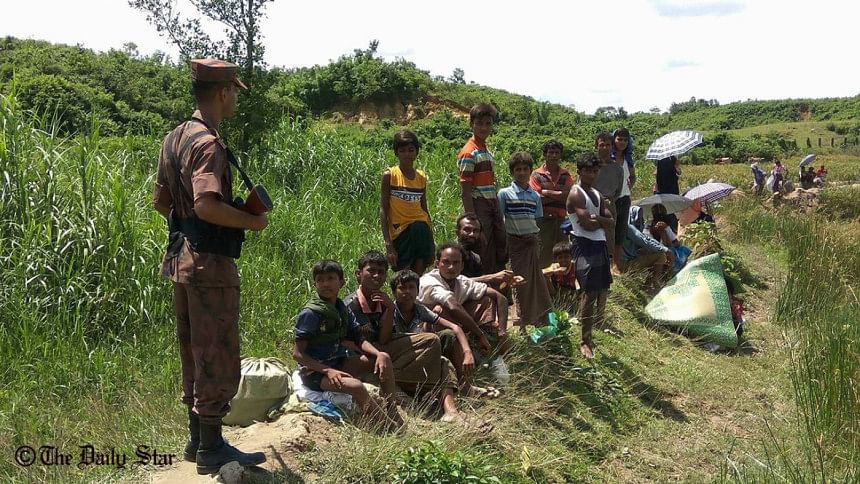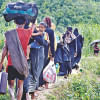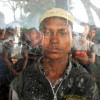Myanmar must change tack on Rohingyas

The very fact that Myanmar has termed the recent militant attack on its security forces as being the work of "extremist Bengali insurgents" underlines the very crux of the problem. It restates their position on the Rohingyas, their unwillingness to accept the ethnic minority for what they are. Rohingyas, who happen to be Muslims, are as Bengali as Americans are English. And this attitude of rejecting one of its own has underpinned Myanmar's policy regarding the Rohingyas.
It bears restating that the Rohingyas have been living in Arakan, now Rakhine State of Myanmar, for centuries. Regrettably, it was with one stroke of pen that a minority group, an integral part of the Burmese culture and society, being its citizen, was made stateless by the Burmese strongman and dictator Gen Ne Win. That, we understand, was his reaction to his abortive attempt to force the Rohingyas out of the western province into Bangladesh permanently. He managed to push out nearly one third of the total Rohingya in Arakan, a good 300,000 of them, by a military operation codenamed "Operation King Dragon"ostensibly for the purpose of checking illegal immigrants, in 1978. And this was by an anti-Rohingyain character. But strong international reaction against the ethnic purge forced him to take back most of those from Bangladesh. That policy of expulsion having failed, he resorted to a legal expedient—the Citizenship Law of 1982.
History must be recounted to put a perspective to the issue. The current spate of violence that was started last October is a strategy that Myanmar has used and continues to use to clear its territory of one of its ethnic minorities, made stateless by a government fiat. The Rohingyas have been described as the most persecuted stateless people in the world. That the Rohingyas are ghettoised and have had their movement restricted is nothing new. Their movement has been controlled since 1964 through a law which restricted the movement of the Muslims of Arakan especially prohibiting the movement out of Akyab District towards east. Thus, the Rohingyas were put into a sort of incarceration since 1964.
The latest extremist attack of August 25, which merits the strongest contempt, is also a cause for concern for Bangladesh. Recall the fact that it was the killing of several Myanmar security personnel by the militants that triggered the violence wreaked on the Rohingyas in the name of fighting insurgency in October 2016. That action came in for criticism from the local head of UN refugee agency who went so far as to characterise the killings as ethnic cleansing.
For Bangladesh, the Rohingya problem has cast it between the devil and the deep sea or a Catch 22 situation if you like. While on one hand it cannot officially open its doors to the persecuted Rohingyas, it can neither forcefully turn them back into uncertainty. Strategic compulsions preclude the former stance, it being very unadvisable since that would encourage the Myanmar government to continue to create conditions to leverage all the Rohingyas permanently out of their homeland, and fulfil its longstanding aim. But hosting a large number of refugees will impose, and it already has, adverse security as well as socio-economic consequence on Bangladesh. Although Bangladesh is not a party to the 1951 Refugee Convention or its 1967 Protocol, it has acted under the obligation of the customary international law and the principle of non-refoulement not to reject asylum seekers at its border when they are escaping persecution in their homeland and trying to seek security from threats to their lives and liberty. Technicalities cannot be impediments to humane behaviour.
It has been our position that since the situation is of Myanmar's own making, it should be for it to resolve it. But that Bangladesh cannot remain an impassive neighbour because it has been directly affected by the developments in the State of Rakhine has been demonstrated by the government's expressed position on the issue.
Amidst all the killings in one part of her country, the silence of Su Kyi was very deafening and all that she could say about the atrocities of the security forces was that they were working as per "the law". However, a redeeming feature in the entire pathetic situation was the setting up of the Annan Commission in August last year to "find a sustainable solution on the complicated issues in Rakhine State." And if it was not a ruse by Su Kyi to placate international opinion of Myanmar's Rohingya policy, then the government of Myanmar should recognise the merit of the recommendations of the Commission which was handed over to its President on August 24 and act on it.
It is about time Myanmar realised the error of its Rohingya policy. If anything it has festered extremism among the younger members of the Rohingya community. This cannot be allowed to happen. We must make it abundantly clear that our stake in the region is not only humanitarian. If it is allowed to simmer it would adversely affect us in equal measure. And that we cannot allow to happen.
Brig Gen Shahedul Anam Khan ndc, psc (Retd) is Associate Editor, The Daily Star.










Comments